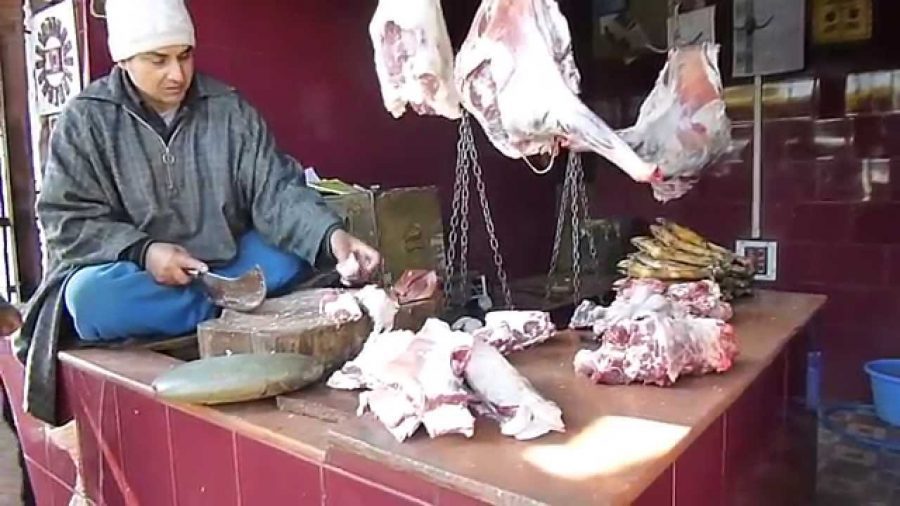Mutton Shortage in Kashmir: Illegal Checkpoints, Trader Strike Disrupt Valley’s Food Chain
By: Javid Amin | 30 July 2025
Five Days, No Meat: A Valley on Edge
Kashmir is grappling with an unusual yet deeply felt crisis—the mutton strike, now in its fifth consecutive day, has all but halted the region’s meat supply, creating both logistical chaos and cultural dissonance.
Markets are shuttered, butcher shops deserted, and homes—especially those preparing for weddings—are scrambling for alternatives.
But this isn’t just about meat. It’s a story of administrative inaction, interstate extortion, and the economic vulnerability of Kashmir’s trade networks.
What’s Fueling the Crisis?
01. Extortion at Shambhu and Madhopur Checkpoints
Mutton dealers allege blatant harassment and illegal toll collection at border checkpoints in Punjab, where truckers transporting livestock from Rajasthan, Delhi, and Haryana are forced to cough up as much as ₹20,000 per vehicle.
“They call it tax, but there’s no receipt. It’s pure extortion,” says a dealer from Anantnag.
This bribe-based system has skyrocketed operational costs, making the trade financially unviable—especially when profits are already thin due to fuel hikes and animal mortality during transit.
02. Official Apathy and Hollow Committees
Despite multiple representations to the administration, mutton dealers say no concrete steps have been taken:
-
A three-member committee formed to liaise with Punjab officials has shown no tangible progress.
-
Repeated letters and public appeals to higher-ups have gone unanswered.
-
Traders accuse the government of treating the issue as a logistics hiccup, not a trade blockade.
“We’re not asking for subsidies. We just want safe passage for our goods,” says a member of the Mutton Dealers Union.
03. A Valley That Eats Mutton—and Lives by It
Kashmir consumes over 15 lakh sheep annually, with 41% sourced from outside the Union Territory. The supply isn’t just essential—it’s foundational to Kashmir’s culinary and cultural fabric, from daily meals to elaborate Wazwan feasts.
Weddings, Eid functions, and religious observances are now being scaled down or postponed, with chefs and caterers left helpless.
Economic Fallout: More Than Just Meat
The ripple effects of this disruption are widening:
-
Transporters and truckers are losing daily wages.
-
Local butchers and helpers, often daily earners, face loss of livelihood.
-
Cold storage and feed businesses are stuck with unsellable inventory.
-
Hospitality and catering services are reeling, especially during peak wedding season.
And let’s not forget the psychological stress—a culture that prides itself on hospitality and culinary richness now finds itself unable to offer even basic mutton dishes.
Support Grows, But Action Lags
The Kashmir Economic Alliance, student unions, and civil society have rallied behind the dealers, urging both the J&K and Punjab governments to resolve the issue diplomatically and swiftly.
“Extortion at borders isn’t just illegal, it’s an attack on Kashmir’s economic dignity,” said a KEA spokesperson.
But as the Punjab administration stays silent, and the J&K authorities shuffle between committees and memos, the trust deficit widens.
Beyond Mutton: A Lesson in Trade, Ethics, and Autonomy
This crisis isn’t a one-off incident—it reflects Kashmir’s economic fragility in the face of interstate dependencies, and the urgent need for trade autonomy and policy protections.
It raises critical questions:
-
Why is a trade corridor as essential as livestock transport left vulnerable to non-state actors and informal extortion rings?
-
Shouldn’t there be central regulatory oversight for perishable goods transit across state lines?
-
Why are border trade protocols not digitized to eliminate corruption?
What Needs to Happen Now: A Five-Point Recovery Plan
-
Intervention by Union Government: A formal protest must be lodged with Punjab and an interstate commission formed.
-
Livestock Transit Pass Digitization: Introduce e-permits and GPS tracking to monitor livestock transport and eliminate “invisible tolls.”
-
Compensation for Losses: The administration should offer hardship grants or transport reimbursements to affected dealers.
-
Emergency Meat Supplies: Explore alternate procurement from within UT or legal imports until trade resumes.
-
Public Communication: Daily updates from the administration to maintain transparency and rebuild public trust.
Closing Thoughts: This Is Not Just About Meat—It’s About Dignity
Mutton may be the visible crisis, but beneath it lies the age-old problem of Kashmir’s economic marginalization. When a truckload of sheep must bribe its way into the Valley, it’s not just trade that’s under attack—it’s identity, tradition, and autonomy.
As families prepare for weddings without Wazwan, and dealers continue their strike in the name of dignity, the real question echoes:
How long can a culture endure without the freedom to feed itself?



